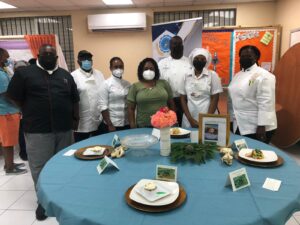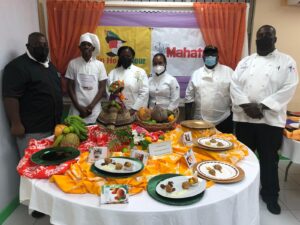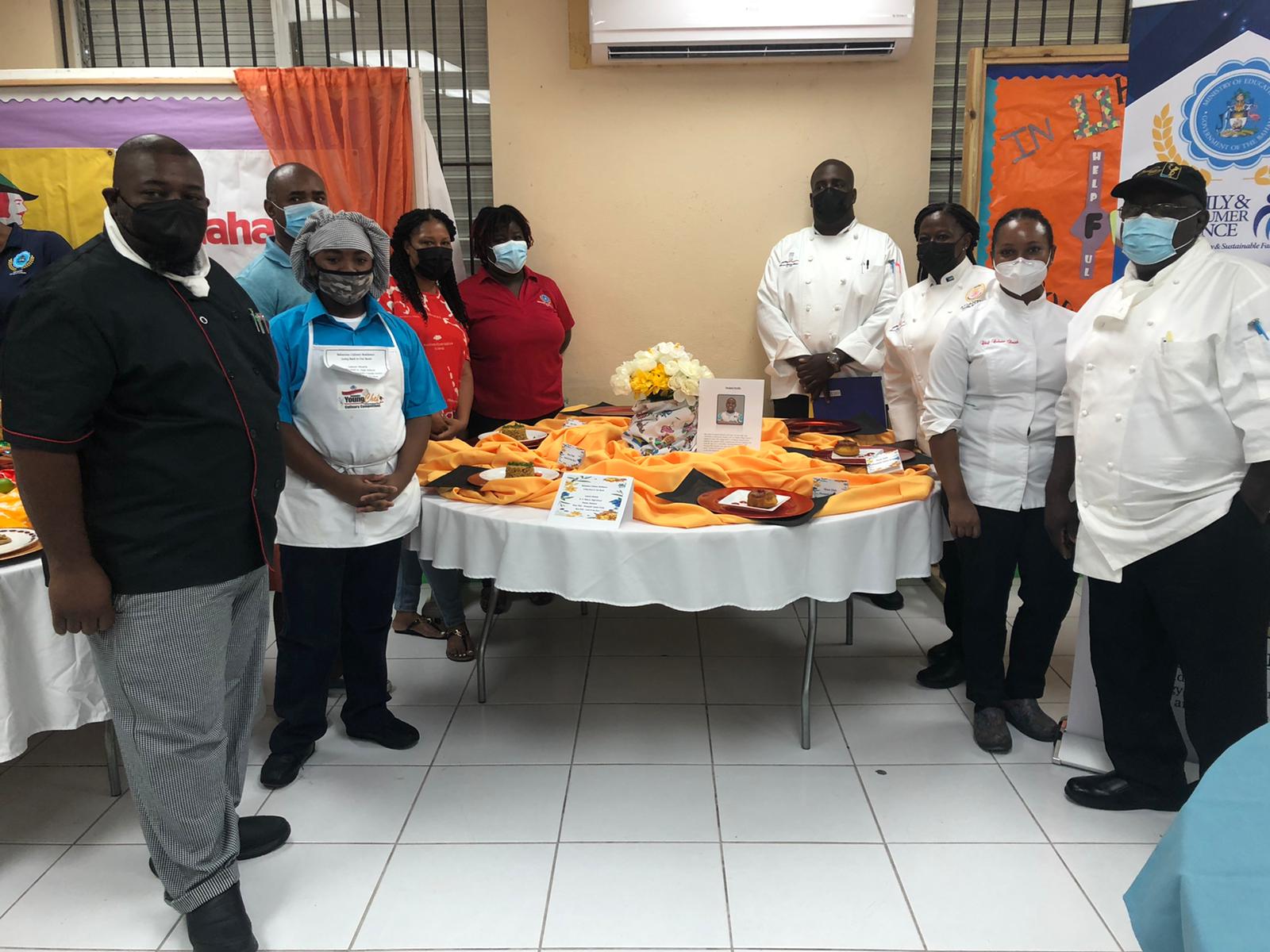#TheBahamas, October 19, 2021 – – Despite setbacks and limitations due to COVID-19, Lamont Missick, H.O. Nash; Gerardo Annacius, Anatol Rodgers and Brianna Butterfield of Kingsway Academy, overcame the odds and finished first, second and third respectively in the second phase of the recent 29th Annual Bahamas Young Chef New Providence District Culinary Competitions.
With hybrid lessons and just two weeks of in-person classes supervised by teachers, the three students, who are enrolled in Family and Consumer Science Education, stepped up to the plate and earned the right to enter the upcoming third phase (National Round) of the annual contest.
Now into its 29th year, the annual district competition, sponsored by the Ministry of Education along with Robin Hood Flour and Mahatma Rice, was held at Anatol Rodgers Senior High School, October 7 and 8. Under the watchful eyes of judges who are all professional chefs — Clement Williams, Jimmy Dean, Chief Judge Gerald Rolle, Hazel Rolle, and Celeste Smith — the students were required to use Mahatma Rice and Robin Hood Flour to prepare a dish and dessert based on the theme “Bahamian Culinary Resilience: Going Back to Our Roots.”
Hood Flour and Mahatma Rice, was held at Anatol Rodgers Senior High School, October 7 and 8. Under the watchful eyes of judges who are all professional chefs — Clement Williams, Jimmy Dean, Chief Judge Gerald Rolle, Hazel Rolle, and Celeste Smith — the students were required to use Mahatma Rice and Robin Hood Flour to prepare a dish and dessert based on the theme “Bahamian Culinary Resilience: Going Back to Our Roots.”
Following the grueling round in the kitchen and interviews by the judges, Raquel Turnquest, Education Officer congratulated the students and parents, and offered advice to the teachers.
“We appreciate all of the time and effort that you put into your children. This competition is a true partnership between home, school and industry. The chefs are willing to give their input and give them [the students] the benefit of their experience.
“We have three young persons who are very much into what they are learning in school. They are putting their best foot forward. All of them are automatically in the national round,” said Ms. Turnquest.
“COVID-19 is forcing us to use technology in new and creative ways. You are now able to bring industry professionals into your classroom almost on a regular basis who don’t have to leave where they are to get into your classroom to give the students the benefit of their knowledge.”
She urged the students to use the judges’ critiques to refine and elevate their dishes.
“You saw the experience of working in the kitchen with persons viewing and walking through while you are working. That is something valuable. Take advantage of it and we’ll see you again for the National round. Congratulations to all of you today.”
Lamont Missick, 14,
Flour dish: Pineapple upside down muffin
Rice Dish: Land and Sea Rice
Lamont said he used the opportunity to sharpen his culinary skills.
“I realized my love for culinary arts from the age of 8. I remember watching Ratatouille, and hearing that “anyone can cook, but only the fearless can be great. I aim to be great and one day become and executive chef in my own restaurant,” said the ninth grader.
Brianna Butterfield, 14
Flour dish: Sugar apple almond muffins
Rice dish: Spinach Carrot Rice Cup with grouper pineapple sauce
“I love to cook and I wanted to boost my cooking skills,” said Brianna.
Gerardo Annacius dubbed his dishes ‘Fall ‘n’ Love’.
Rice dish: Conch and shrimp rice ball with plantain and coconut deep fried in coconut topping
Flour dish: Toasted bennie spiced cream puff with native pumpkin and coconut crème filling topped with ginger caramel
All of the judges commended the students on their dishes and encouraged them to continue to work hard.
Lamont was praised for his organized and sanitized kitchen-station. Also noted was his flavorful ‘spot on’ rice dish from which exuded flavors of conch, lobster, salt beef and coconut milk.
Chef Williams encouraged him to improve his presentation and move away from serving rice the old fashioned way of “cupping” in a bowl.
The judges were impressed with Annacius’ theme: “Fall ‘n’ Love’ and gave him pointers on how to improve his dish and dessert.
“You experienced a slight setback in the kitchen and your dessert dish did not come out as expected — but you did not stop, you made an effort to present something. Your dessert was flavorful; it did not rise like it should but you executed based on what you had,” said Chef Smith.
By Kathryn Campbell
(BIS Photos)


 Bahamas News1 week ago
Bahamas News1 week ago
 Health1 week ago
Health1 week ago
 News5 days ago
News5 days ago
 Caribbean News1 day ago
Caribbean News1 day ago














